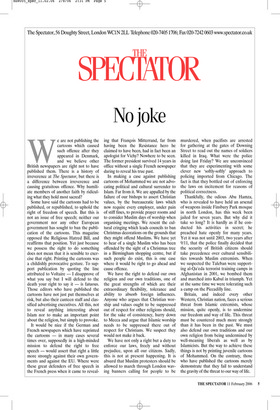No joke
We are not publishing the cartoons which caused such offence after they appeared in Denmark, and we believe other British newspapers are right not to have published them. There is a history of irreverence at The Spectator, but there is a difference between irreverence and causing gratuitous offence. Why humiliate members of another faith by ridiculing what they hold most sacred?
Some have said the cartoons had to be published, or republished, to uphold the right of freedom of speech. But this is not an issue of free speech; neither our government nor any other European government has sought to ban the publication of the cartoons. This magazine opposed the Religious Hatred Bill, and reaffirms that position. Yet just because we possess the right to do something does not mean that it is sensible to exercise that right. Printing the cartoons was a childishly provocative gesture. To support publication by quoting the line attributed to Voltaire — I disapprove of what you say but I will defend to the death your right to say it — is fatuous. Those editors who have published the cartoons have not just put themselves at risk, but also their canteen staff and classified advertising executives. All this, not to reveal anything interesting about Islam nor to make an important point about the religion, but simply to provoke.
It would be nice if the German and French newspapers which have reprinted the cartoons — in many cases several times over, supposedly in a high-minded mission to defend the right to free speech — would assert that right a little more strongly against their own governments and against the EU. Where were these great defenders of free speech in the French press when it came to reveal ing that François Mitterrand, far from having been the Resistance hero he claimed to have been, had in fact been an apologist for Vichy? Nowhere to be seen. The former president survived 14 years in office without a single French newspaper daring to reveal his true past.
In making a case against publishing cartoons of Mohammed we are not advocating political and cultural surrender to Islam. Far from it. We are appalled by the failure of our bishops to assert Christian values, by the bureaucratic laws which now require every employer, under pain of stiff fines, to provide prayer rooms and to consider Muslim days of worship when organising meetings. We resent the cultural cringing which leads councils to ban Christmas decorations on the grounds that they might offend Muslims. We have yet to hear of a single Muslim who has been offended by the sight of a Christmas tree in a Birmingham shopping centre, but if such people do exist, this is one case where it would be right to go ahead and cause offence.
We have the right to defend our own religion and our own traditions, one of the great strengths of which are their extraordinary flexibility, tolerance and ability to absorb foreign influences. Anyone who argues that Christian worship and values ought to be suppressed out of respect for other religions should, for the sake of consistency, hurry down to Mecca and argue that Islamic worship needs to be suppressed there out of respect for Christians. We suspect they would not make it back.
We have not only a right but a duty to enforce our laws, freely and without prejudice, upon all our citizens. Sadly, this is not at present happening. It is absurd that Muslim protesters should be allowed to march through London waving banners calling for people to be murdered, when pacifists are arrested for gathering at the gates of Downing Street to read out the names of soldiers killed in Iraq. What were the police doing last Friday? We are unconvinced that they are experimenting with some clever new ‘softly-softly’ approach to policing imported from Chicago. The fact is that they bottled out of enforcing the laws on incitement for reasons of political correctness.
Thankfully, the odious Abu Hamza, who is revealed to have held an arsenal of weapons inside Finsbury Park mosque in north London, has this week been jailed for seven years. But why did it take so long? It is hardly as if he conducted his activities in secret; he preached hate openly for many years. Yet it was not until 2003, two years after 9/11, that the police finally decided that the security of British citizens should take precedence over cultural sensibilities towards Muslim extremists. When we suspected the Taleban were supporting al-Qa’eda terrorist training camps in Afghanistan in 2001, we bombed them and marched into Kabul in triumph. Yet at the same time we were tolerating such a camp on the Piccadilly line.
Britain, and indeed every other Western, Christian nation, faces a serious threat from Islamic extremists, whose mission, quite openly, is to undermine our freedom and way of life. This threat must be countered much more strongly than it has been in the past. We must also defend our own traditions and our own religion from being undermined by well-meaning liberals as well as by Islamicists. But the way to achieve these things is not by printing juvenile cartoons of Mohammed. On the contrary, those who have published the cartoons merely demonstrate that they fail to understand the gravity of the threat to our way of life.














































 Previous page
Previous page